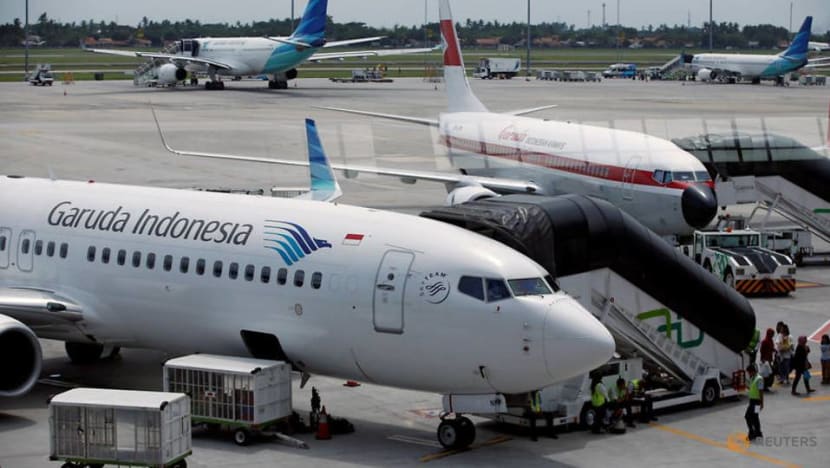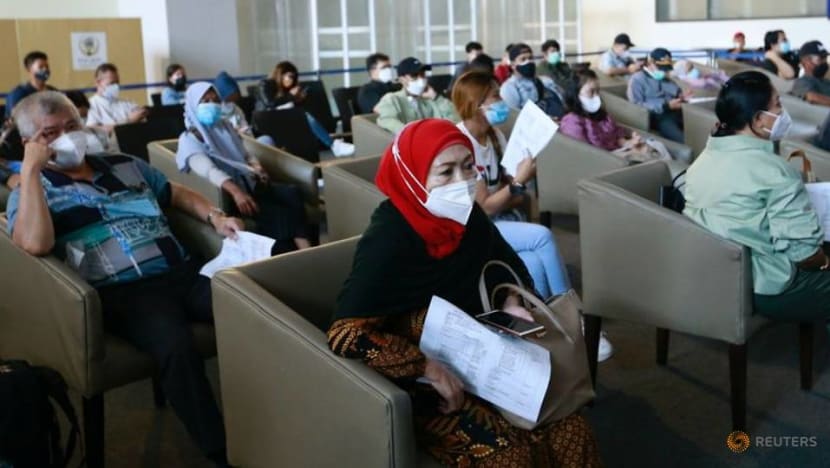Commentary: Is Garuda Indonesia on the brink of bankruptcy?
Like airlines the world over, Indonesia’s flag carrier Garuda has found itself deep in debt but can it afford to wait out until demand for travel returns, asks NTU’s James Guild.

Garuda Indonesia planes are seen on the tarmac of Terminal 3 at Soekarno Hatta International Airport near Jakarta. (Photo: REUTERS/Darren Whiteside)
SINGAPORE: COVID-19 has battered Indonesian flag carrier Garuda’s revenue and sent earnings plunging, causing trading of the airline’s shares to be halted recently after a bond default.
CEO Irfan Setiaputra claimed the airline’s total debt was Rp 70 trillion (US$4.9 billion). This led to a meeting with the Ministry of State-Owned Enterprises, which put forward a number of potential resolutions including injections of state capital, privatisation or bankruptcy proceedings while the company restructures some of its debt.
Irfan did not break down the Rp 70 trillion figure in detail, but Garuda’s most recent financial disclosure from September 2020 provides some clues.
By late 2020, total liabilities had ballooned to US$10.36 billion against US$9.9 billion in assets, meaning the company was returning negative US$455 million in equity to its shareholders.
READ: Bugs and bird nests: Airlines dust off planes grounded by COVID-19
READ: Commentary: Airlines have it bad with COVID-19 but airports have it worse
With liabilities exceeding assets, financial insolvency is a real concern. This is especially so in Garuda’s case, as business has been frozen by pandemic-related travel restrictions.
According to company operating statistics, international passengers fell from 193,380 in February 2020 to just 8,967 a year later.
This begs the question whether Garuda’s financial problems should be viewed as a referendum on Indonesia’s style of state capitalism, or a result of a major and unpredictable external shock to demand. While Garuda’s corporate management is not blameless, the latter explanation is more persuasive.
STATE-OWNED LIABILITIES?
No airline in the world has enough cash on hand to deal with an almost 100 per cent drop in international passenger traffic.
Even Singapore Airlines, one of the better-run carriers in the region, needed a lifeline from its majority shareholder Temasek and recently had to raise cash through a sale and leaseback of several of its aeroplanes.
Critics have zeroed in on the Rp 70 trillion debt as evidence of corporate mismanagement and an alleged tendency of Indonesian state-owned enterprises to borrow money irresponsibly. But that is not quite true in this case.
Garuda’s liabilities include a US$500 million sukuk bond (an Islamic finance tool similar to a bond), US$922.6 million in bank debt and a growing backlog of trade payables that topped US$1.4 billion last year.
READ: Southeast Asia risks falling behind other regions in recovering aviation and tourism
READ: Commentary: Why Singapore’s travel restrictions will keep changing for a while more
But its balance sheet woes are mainly the product of an accounting rule change rather than an explosion in unsustainable debt.
The majority of Garuda’s new liabilities come from its finance lease obligations. According to the September 2020 financial statement, lease obligations went from US$52.6 million in September 2019 to US$5.1 billion a year later.
Garuda, like many airlines, does not own most of its fleet. Instead it leases the majority of its aircraft from third parties.
Prior to 2020, the accounting rules used by the company meant that they only had to record the minimum lease payments as operating expenses when they were incurred.
The full value of the remaining lease contracts did not appear on the balance sheet as a liability.
Under new accounting guidelines adopted in 2020, the full value of the outstanding leases now appears on the balance sheet. And under normal business conditions, with healthy cashflow, this would probably not be a problem.
For instance, in 2019 Garuda generated over US$600 million in net cash from its operations. But with cashflow strained, it is a problem.
THREAT OF BANKRUPTCY
Going forward, Garuda’s corporate leadership and the government are probably going to use the threat of bankruptcy as leverage as they enter restructuring negotiations with the lessors.

This is the same tactic that Malaysia Aviation Group, Malaysia Airlines’ parent company, used in early 2021, and it worked for them. After threatening to declare bankruptcy a British court approved an agreement to restructure nearly US$4 billion owed primarily to airplane lessors.
READ: Commentary: Airlines have little choice but to not be airlines for a few years
Once the deal was in place, sovereign wealth fund Khazanah Nasional Berhad, the group’s sole shareholder, injected US$890 million to shore up the airline’s balance sheet. We will probably see something similar play out with Garuda.
But first, a credible threat of bankruptcy must be made in order to get the creditors to play ball.
This is where the logic of Indonesia’s state capitalism makes itself apparent. The state will not willingly give up its national airline, either by privatising it or liquidating its assets in bankruptcy.
This is a function of economic nationalism as well as a desire to maintain some degree of direct control over a key market.
While Garuda’s shares are publicly traded, 86 per cent of the company is held by either the government or Chairul Tanjung, one of the wealthiest people in Indonesia.
This insulates the airline from the more capricious vagaries of the market because even as they are losing money, they have time to negotiate and consider their options without worrying too much about shareholder pressure.
This is important because the interests of shareholders may not always align with economic or political interests of the state.
READ: Commentary: This is why Singapore needs to save its airlines and aviation sector
READ: Commentary: Targeted travel restrictions needed but careful not to undermine Changi Airport's connectivity
Arguably a strategic asset like a national airline should not be vulnerable to market pressures where, during times of distress, deep-pocketed investors can snatch it up or shareholders can try to force a sale in order to salvage some value.
Instead, the state can ensure the airline limps along until demand recovers, using the threat of bankruptcy to extract more lenient conditions from its creditors along the way.
It may very well be that the way Indonesian state-owned enterprises, including Garuda, manage their debt is not tenable in the long-term. But the financial woes of a state-owned airline during a global pandemic don’t tell us much about that, one way or the other.
James Guild is an Adjunct Fellow at the S Rajaratnam School of International Studies, Nanyang Technological University, Singapore. This commentary first appeared on East Asia Forum.










